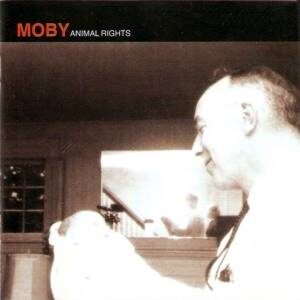 By Jae-Ha Kim
By Jae-Ha Kim
Chicago Sun-Times
February 9, 1997
Talk about bad timing.
Just as the recording industry is giving electronic music the big public relations push, Moby – techno’s premier poster boy – has shifted gears and turned to heavy metal.
Metal may not be as au courant as techno, but neither is it regarded as the pariah of rock ‘n’ roll. Hard-rock elements have been poached by a slew of acts; Veruca Salt’s latest effort, for example, was produced by Metallica collaborator Bob Rock. Even Pat Boone jumped on the metal bandwagon by releasing a tongue-in-cheek (but still horrible) record covering heavy metal tunes.
Like those artists, who took a format and twisted it to suit their styles, Moby’s hard-rock treatment isn’t on the same wavelength as, say, Pantera. On his new record, for instance, the high-decibel songs alternate with lovely ambient melodies.
But the fact is that Moby’s musical about-face on “Animal Rights” (in stores Tuesday) is as shocking to electronic-music fans as it would be to heavy metal fans if Metallica chose to play acoustic sets.
“I’m a confusing musician,” Moby acknowledged, phoning from his New York home. “I knew with this album there would be a backlash since it’s such a different style from last time (on `Everything Is Wrong’). But in general, I feel I’ve been treated very fairly in my career. I’ve been making music for 22 years, and I don’t think it would be natural to want to do the same thing for any length of time.”
Techno purists may blanch when they hear “Animal Rights.” But Moby’s new musical direction – a blend of glam-style vocals and screeching guitars – isn’t surprising given that his latest projects were remixing songs for Metallica, Soundgarden and the Smashing Pumpkins.
“My album is a reflection of what I’ve been listening to over the last few years,” said Moby, 31, who was born Richard Melville Hall. “From 1985 to 1991 I listened to almost only dance music. Then I began listening to hard-core punk and some commercial alternative stuff. As the scene changed, the music changed with it. To me dance music is still nice, but it’s anonymous.
“If (`Animal Rights’) was trance or jungle (music), I think people would have an easier time connecting me to it,” he said. “Two-thirds of my album is dark, hard metal, which isn’t particularly trendy music now. But it’s not just hard rock, either. It’s got those quiet classical things and the instrumental stuff. There’s a lot going on, and that’s the context I choose to work in.
“That doesn’t mean my work is great, but I do think there is a huge range of things going on in my music that aren’t covered by the terms `techno’ or `heavy metal’ or whatever.”
The New York-based artist hasn’t finalized his tour dates yet. But when he hits the road later this year with his four-piece rock band, Moby promises to drag out his old keyboards and play some of his older techno hits as well.
But will he dance to them?
“I try to have as gestalt an experience as possible on a cerebral and a visceral level,” he said.
Asked to explain, Moby said, “I’m a terrible dancer! The hundreds of years of white, Anglo-Saxon upbringing made me a bad dancer. But if there are strobe lights, I can look fairly competent.”
Reared by his mother and grandparents (his father died in an automobile accident when Moby was a toddler), Moby said his childhood was a mixture of the mundane and the extraordinary. His grandparents lived in a well-to-do neighborhood in Connecticut; his mother was a free spirit who didn’t discourage him from experimenting with music and drugs. He is convinced that a house they moved into was haunted (“It spoke to me”).
“My grandparents were rich suburban types, and my mom was a pot smoker,” he said. “So getting to live with my grandparents at an early part of my life was stabilizing. I didn’t have a conventional upbringing, but it was what I knew. I didn’t have a hard life, but I do think there’s some truth that adversity breeds strength.”
These days, Moby’s got his roots in two homes: a house in upstate New York and a loft-in-progress in New York City that he purchased last April.
“I’m a dual property owner,” he said. “Who’d have thought that things would work out that way for me?”
Moby, who is descended from Moby-Dick author Herman Melville, got his nickname as a little kid. “I’m proud to be named after the book,” said Moby, 31. “On an allegorical level, (the book) is about the struggle between 19th century rational human beings and . . . ”
Laughing, he added, “Oh, don’t listen to me. I started the book three or four times and never finished.”
Too busy working on music, right?
“Well, no,” he said. “I’m not very patient. And it bothered me that he kept describing (the whales) as fish. I couldn’t take that.”